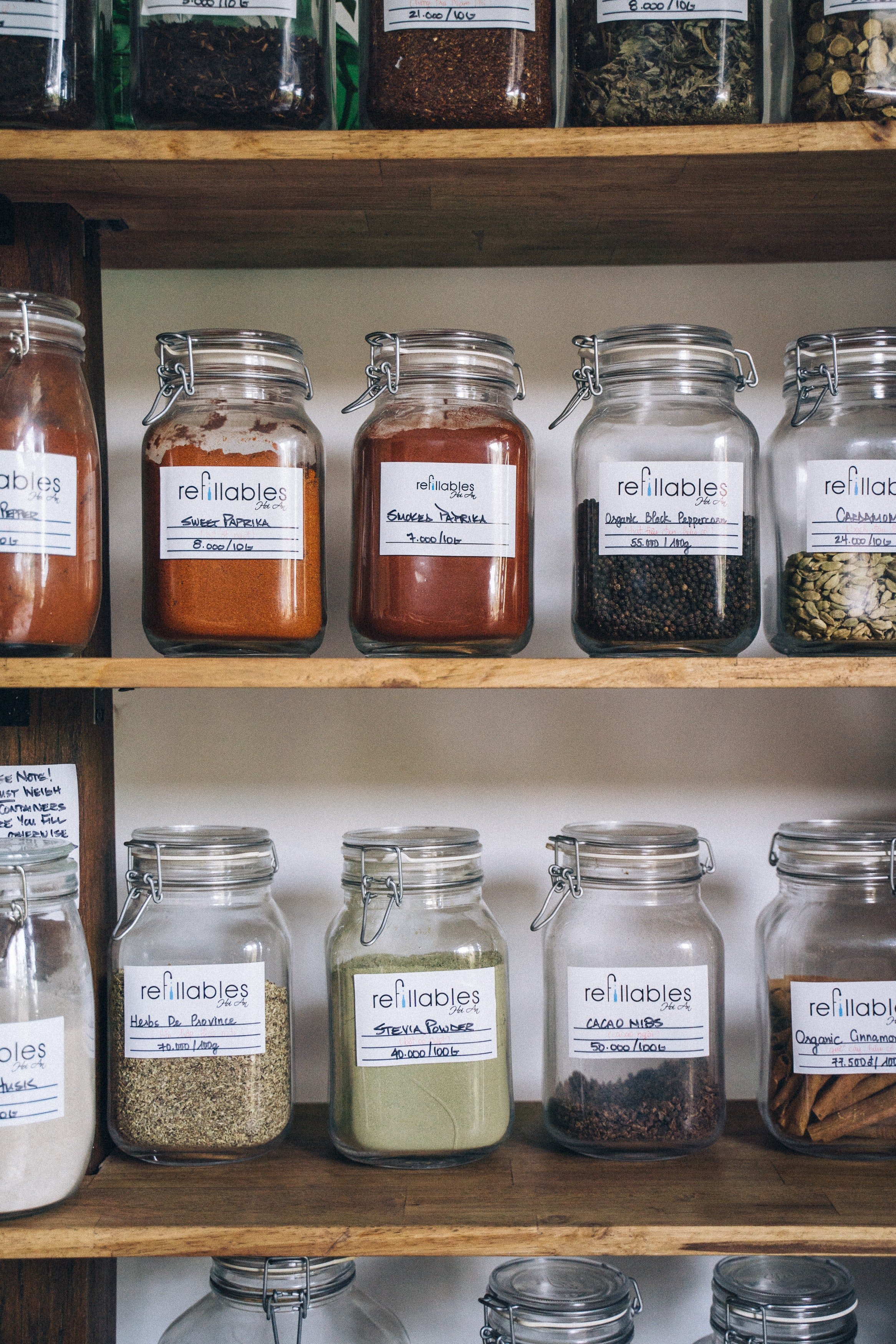Labeling: The Good, the Bad, and the Ugly
Somewhere back in human history some bright ancestor thought that putting a label on a pot, jar, or container of some kind was a useful idea. Perhaps it was some ancient Pharaoh who wanted to be sure his chef knew which clay pot contained the beans and which contained corn. Who knows? My guess is that it made a difference to the Pharaoh as to whether he had bean soup or curried rice casserole.
In any case, it became a standard practice from that moment on to put labels on containers. It's been a well accepted normal behavior that has made life infinitely easier for everyone. It may not rank with the invention of the wheel or discovery of how to make fire; however, it is a useful practice that we are all using every day generally without giving it too much thought. Just this morning when I stumbled out of bed and made my way to the kitchen I was able to identify which jar had coffee in it and knew I could take it from there. Just one label, "Coffee", was all I needed. In short, part of what makes a household run well is to have a good supply of food, clothing, and necessary items that are organized in convenient places in containers with labels on them. To sum it up labeling is a good thing to do and a great time saver because we don't have to open every container to discover its contents. Labeling food is GOOD.
This becomes extremely significant when we come to the issue of what is safe to put into our bodies as opposed to any unsafe materials that could be life threatening for us to consume. For this reason we have certain symbols, in addition to words, to help safeguard our health. For example, if you are looking though your pantry and you see a box that says "Rat Poison" you have a pretty good idea that you don't want a bowl of it for breakfast. Just to be sure you are properly informed as to the contents there is often a skull and crossbones to emphasize that this is dangerous. The container may say, "Not for Human Consumption" in addition to the skull and crossbones. Even in our automobiles there are warnings signs that are often included with illustrations to make the point. Above the visor in our cars there is a warning to "Flip the Visor Over' to read about the airbag operation that may potentially injure or even kill children who ride in the front seat. This message is fortified with an illustration of a child in a car seat being injured In other words, it is important to to have labels that let us know what is BAD.
All that being said, it is also important to understand that labeling people in our lives may have a certain utility and convenience. We all learned that early on in school when we took tests and were eventually labeled ourselves. Some of us were average students and could be predicted to have a C average. Others were A students or even Honor Students and would be predicted to have much higher grades. Those unfortunate students who did not do well in school, for a variety of reasons were often labeled "slow readers" or "problem children". They begin to see each other according to the label that they've heard other's apply to them. For example, my next door neighbor received straight As in school and even got up early to study algebra on television classroom while he was in grade school. Clearly Arthur was labeled a "smart kid" and would eventually go on to get a Ph. D. in physics. One other neighbor kid, Larry, flunked the 5th grade and became a very angry adolescent and was label "a bad kid". Did these two boys suffer or benefit because they knew what their labels were? Did Arthur try harder because he was labeled "smart"? Did Larry give up on school because he was labeled a "bad kid"? Would these two boys have followed a different lifestyle and had different outcomes in their adult life had they not been labeled? Did either of them feel trapped because of the box they had been put in and the label on their box? It's a good question.
When we label people, a process known colloquially as "stereotyping", we are in a sense using a shortcut. We quickly put that person in a category. We decide early on if they are interesting and approachable or uninteresting and possibly dangerous. Stereotyping saves time and energy for our cognitive processes. For that reason it is a common practice to knowingly, or perhaps more often unknowingly, stereotype people that we meet and then leave them in that stereotyped category or container forever. It just makes life much simpler and more energy efficient to do this. This is especially true if you routinely meet a great number of people. As a teenager I frequently decided if someone was attractive or interesting to me by putting them in one of two categories of either "Cool" or "Uncool". Once they were in their respective category it was difficult to get them into another category. Teachers were rated "Cool" and "Uncool" as were areas of academic interest. For me art was "cool" and science was "uncool". Not surprisingly my grades reflected my stereotypes.
It doesn't take long to establish a label or stereotype when meeting a new person. According to the research of two Princeton researchers, Janine Willis and Alex Todorov, it takes only 1/10th of a second for a person to render an internal judgement or stereotype regarding the person they just met. You can review their work by going to https//doi.org/10.111/j1467-9280.2006.01750.x. Rightly or wrongly we judge people and put them in categories often without meeting them but judge them solely by their appearance. They also confirmed that once in a box or stereotype it was very difficult to get out and be viewed objectively.
Stereotypes in the media are often used to quickly establish a character by the directors use of costuming (i.e. heroes usually where white hats or light colored clothing while Villains generally dress in black) or other well established stereotypical characteristics. For example, usually the most attractive actors play the leading roles and least attractive actors are in marginal or even malevolent roles. By using stereotypes the audience is able to quickly follow the plot line and follow the story. Consider actors that you have noticed that play villans; they are thereafter stereotyped in that role and oftened no alternatives.
It is interesting when media directors begin to experiment with putting actors in unexpected and nontraditional roles. For example in the recent Broadway hit "Hamilton", the actor playing Alexander Hamilton is a Puerto Rican and the actor playing George Washington is an African-American. Having members of another race play well known historical figures is certainly a means of making the audience aware of the racial stereotypes and perhaps opening the label or box to view others in a different light.
According to the well respected Pew Research Center in their article dated October 13, 2021 entitled "People in U.S. see stronger conflict in society than in other countries" there is evidence that disagreements in our own society that are more intense than in any of the 17 other developed countries that were researched. Their research noted that members of the three categories surveyed (White Non-Hispanic, Black Non-Hispanic, and Hispanic) all believed that there was "very strong conflicts" between Americans of the two different political parties. The percentages respectively were 93% among Hispanics, 82% among Blacks, and 84% among Whites. These percentages regarding political differences were higher than the three different groups believed regarding strong conflicts over ethnic or racial backgrounds which by comparison were 69% among Hispanics, 82% among Blacks, and 70% among Whites. Perhaps even more disturbing was the Pew Research finding that between members of the two political parities there was strong conflict indicating that both Democrats and Republicans disagreed with the opposite party regarding what were the basic facts of what was happening in the country regarding politics. Approximately 60% of both parties felt that they did not agree with their opposites on even the basic facts of what was happening politically in America. This seems to reflect a major discrepancy between what is portrayed as being honest and true between news networks and social media.
What I have noticed in my own life is that it is very easy to use political stereotypes in our everyday interactions to label people that we agree with as good people and those we disagree with as bad people. I have caught myself reacting to people that I have known and loved, but who have a different political orientation as if they were bad or even villainous people. In a recent encounter on social media I was disappointed to find that the bulk of the interactions online were simply an exchange of insulting names and mindless cussing from the comfort of their computer. As I write about this I am aware that I was primed by the news media that I follow to be very biased in my beliefs and easily angered by those with opposing views. That is not a normal state of mind for me; it is not something that I value in others, yet never-the-less here I was involved in a name calling match that was clearly reminiscent of school yard fist fights than anything close to civil discourse. This is becoming an ever more common occurrence and it does not bode well for the country or myself. It is imperative that I demonstrate a more objective frame of mind and not be lured into mindless and useless name calling that accomplishes nothing but an increase in anger and bodily tension. I have to look past the politics and see that other people are being led by their own sources of information, or perhaps misinformation, to stereotype me as a bad person (i.e. "White Supremacist", "Racist", "Baby Killer", "Anarchist") in whatever is the most painful of the current social media jargon. What a shame that so many people that I meet now stereotype me, without ever getting to know me. Likewise, what a loss for me, if I am unable to see their admirable qualities because of my own tendency to stereotype them. Please join me in working to see the person, and not the politics, before something irreversible happens to our fragile republic.
In summary, while stereotypes can be useful, they have the potential to be UGLY!


